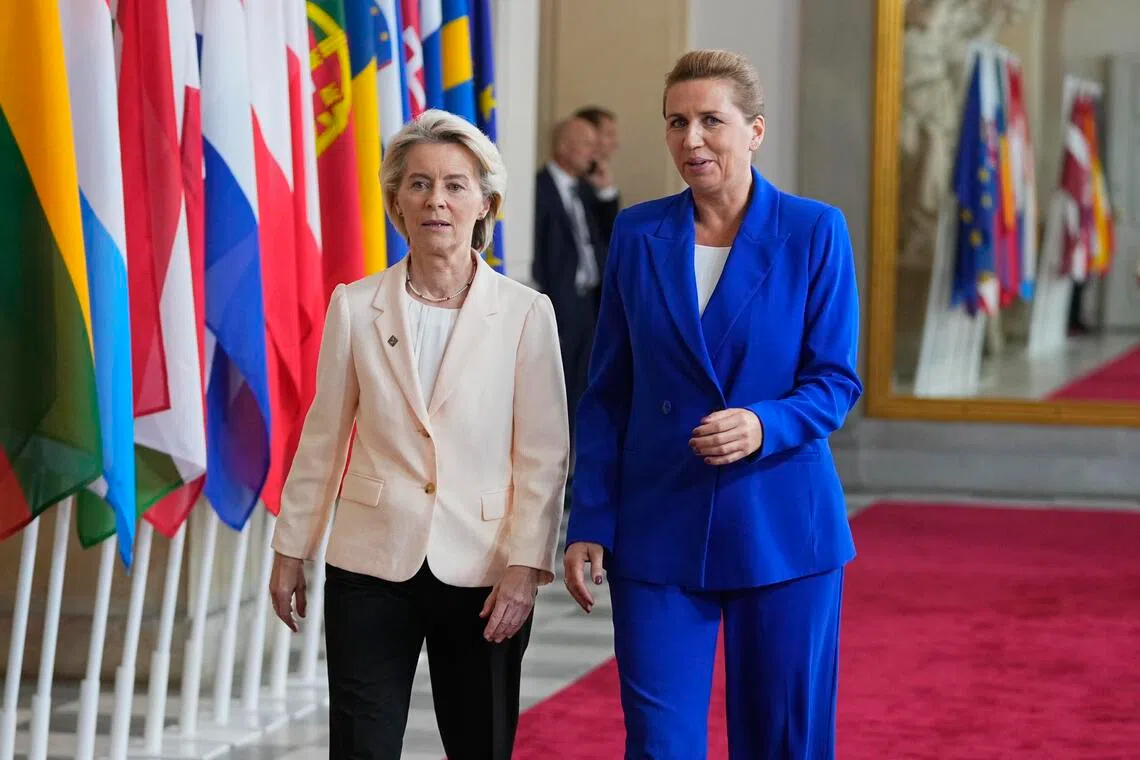EU leaders back ‘drone wall’ to repel Russia after airspace violations
Sign up now: Get ST's newsletters delivered to your inbox

European Commission president Ursula von der Leyen (left) and Danish Prime Minister Mette Frederiksen at the defence meeting in Copenhagen on Oct 1.
PHOTO: EPA
- EU leaders met after Russian drone airspace intrusions to strengthen drone defences and build an EU anti-drone network.
- EU chief Ursula von der Leyen called for a "drone wall" to protect Europe's eastern flank from unmanned aircraft incursions.
- Leaders debated using frozen Russian assets to fund a major loan to Ukraine, despite Kremlin condemnation.
AI generated
COPENHAGEN - European Union leaders on Oct 1 backed plans to bolster the bloc’s defences against Russian drones as they met in Copenhagen, days after airspace intrusions by unmanned aircraft rattled Denmark.
European authorities have accused Russia of brazen violations of the region’s airspace, including with recent incursions by drones fighter jets over Estonia.
“Europe must be able to defend itself,” Danish Prime Minister Mette Frederiksen said after the EU summit.
“We need to strengthen our production of drones, of anti-drone capabilities, and this includes building up a European network of anti-drone measures that can protect and, of course, also neutralise intrusion from outside.”
The incidents in Europe’s airspace highlighted how EU leaders have come to view Russia as a major threat to their continent’s security following Moscow’s 2022 invasion of Ukraine,
Denmark has stopped short of saying who it believes is responsible for the incidents in its airspace last week, which disrupted air traffic
US President Donald Trump has long demanded that Europe take more responsibility for its own security and for Ukraine.
European Commission chief Ursula von der Leyen said: “Russia tries to test us. But Russia also tries to sow division and anxiety in our societies. We will not let this happen.”
The summit’s security was beefed up by troops and anti-drone systems sent by other European countries. And all drone flights over the country have been banned until Oct 3.
Dr Von der Leyen in September called for what she described as a drone wall – a network of sensors and weapons to detect, track and neutralise intruding unmanned aircraft – to protect Europe’s eastern flank.
Her suggestion came just hours after some 20 Russian drones entered Polish airspace, although officials say it had already been under consideration.
The incursion into Poland exposed gaps in Europe’s ability to defend against drones, said officials and analysts. Nato forces deployed fighter jets, helicopters and a Patriot air defence system in their response, shooting down several drones.
Nato Secretary-General Mark Rutte this week praised the drone wall idea as “timely and necessary”, and EU leaders voiced support in Copenhagen on Oct 1.
Finnish Prime Minister Petteri Orpo said: “Russia will continue and we have to be ready, we have to strengthen our preparedness.”
The Commission, the EU’s executive body, has not yet produced a detailed plan for the drone wall, leaving open questions about the cost and practicalities.
Questions over plans
Dr Von der Leyen said Europe’s eastern flank would be a priority, due to its proximity to Russia, but that the “drone wall” would be conceived as a shield for the entire continent.
Earlier, Italian Prime Minister Giorgia Meloni said Europe’s southern borders should also not be neglected amid the focus on the EU’s eastern flank, while French President Emmanuel Macron called for a comprehensive approach to the drone threat.
“In reality, we need advanced early-warning systems to better anticipate threats,” he told reporters, also stressing the importance of deterrence through long-range strike capabilities.
Russia has denied responsibility for the drones over Denmark, disputed that its fighter jets entered Estonian airspace, and said it did not intend to send drones into Poland.
Kremlin spokesman Dmitry Peskov criticised Europe’s talk of a drone wall. “As history has shown, erecting walls is always a bad thing,” he said on Sept 30.
The Copenhagen meeting also offered the first opportunity for leaders of the EU’s 27 countries to debate a proposal to use Russian assets frozen in Europe to fund a major loan to Ukraine.
As they arrived at the summit, some leaders voiced strong support for the idea, while others were more cautious. The Kremlin condemned the proposal as “pure theft”. REUTERS


